OUR STORY BEGAN IN THE FORESTS OF HONDURAS, WHERE OUR SPECIALTY TEAKS AND MAHOGANIES ARE GROWN AND SOURCED FAIRLY FROM PLANTATIONS THAT HAVE BEEN MAINTAINED NATURALLY FOR NEARLY TWO DECADES.
FORESTA specializes in sustainable tropical timbers and is deeply committed to the environment and fair-trade. Our plantations are in Honduras, on specially selected lands that meet the ideal climatic conditions for the development of tropical hardwoods like teak and mahogany. Our mission has been to revitalize the forestry industry there, working exclusively with plantations who naturally cultivate and harvest teak and mahogany.
Our small wood producers have selected the best seedlings and cultivate them in deforested lands many years ago. Organic wood plantations are much safer and drastically reduce the negative health impacts compared to industrial forest management. The heavy use of chemicals in non-organic forestry is not only harmful to local wildlife, but also leads to soil and water contamination that can threaten the health of surrounding villages.
Our plantations work hard to minimize these risks by choosing to grow trees organically, so that local wildlife and communities can flourish. These forests also serve as the home to several animal species that have been introduced over time, such as horses and cattle. These animals coexist freely and in harmony with the trees as they mature, and help fertilize their roots naturally.
Wood plantations are also an important source of income in many rural Honduran communities. Paying the foresters fairly for their effort is critical, and keeps this traditional method of forestry possible — mentalities that have already been adapted for land-cultivated tropical goods such as coffee and cocoa . Doing so not only supports the livelihood of the producers in a way that’s ethical and just, but also makes sustainable and organic farming more approachable.
In addition, all our wood has a plantation certificate. In Honduras, they are issued by the forest conservation institute (ICF) and are like the birth certificate of a forest. This certificate can be obtained by both the small and the large forest producer, once it has been verified that there has been no damage prior to planting, That is, that it has been planted on land where there were previously no trees or century forests. This also favors small producers in rural communities who cannot access other certifications or seals.
If we do not change the way we access these tropical timbers, it will no longer be profitable for producers to cultivate trees naturally in the way that is best for the environment and forests will be replaced with large-scale agriculture. It’s a different way of doing things, sure, but we think it is for the better of the producers who tend to the trees, and the land that nurtures their roots.
